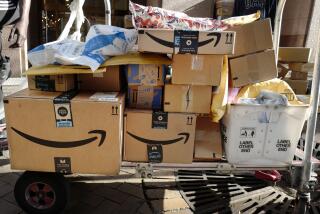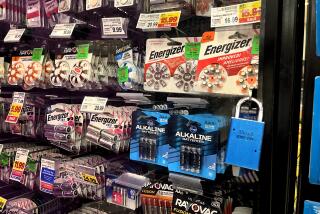Group Will Target the Environmental Claims of Products
- Share via
Initiatives aimed at stopping what are described as deceptive practices by consumer product makers--including an “Environmental Hall of Shame” and supermarket efforts to police environmental claims--will be unveiled today.
Under one program, retailers--including Ralphs supermarkets--will for the first time establish environmental standards for products and ask manufacturers to substantiate environmental claims that have popped up on everything from trash bags to disposable diapers.
“There is a need to have tough, specific and comprehensive standards to keep Green Consumerism from turning into a ruse,” said Craig Merrilees, special projects director for the National Toxics Campaign Fund, which is part of a loose knit coalition of environmental, consumer, law enforcement and retailing groups that will present their plans at a Washington news conference today.
“Our concern on this issue generally has been that there are all kinds of advertising product claims and the public has very little way to judge,” said Dave Rapaport, toxics campaign director for Greenpeace U.S.A. “When you do look in-depth at some of the claims being made on behalf of products, what we’ve seen is that they seem more based on a marketing strategy for selling them than addressing true environmental problems.”
Representatives from consumer and environmental groups will also induct products they claim use deceptive or exaggerated environmental claims into an “Environmental Hall of Shame.”
This assault, however, will focus on retailers who carry the products. Previous attempts to deal with misleading environmental labels have focused on the manufacturers themselves, said Merrilees.
“Many retailers have turned a blind eye to a lot of the manufacturers’ environmental claims that are turning up in the merchandise they sell,” said Merrilees. “The retailers and environmentalists are recognizing a common interest and opportunity here.”
Four Western supermarket chains--Ralphs, Raley’s in Northern California, Fred Meyer in the Northwest and ABCO in Arizona--will set up standards on environmental claims and ask manufacturers to support those claims, said Merrilees. For example, a supermarket might allow a product to claim it is recyclable only if 50% or more of its contents can be recycled.
An even tougher set of criteria must be met for products to pass a “green label certification” program. For example, a green label might be awarded to a paper towel that was made from timber grown on a tree farm, whitened with a steam process instead of chlorine bleach and packaged in a biodegradable material.
Merrilees says environmental and consumer groups will also commission and publish a survey of retailers’ efforts dealing with environmental claims.
New York Atty. Gen. Robert Abrams, who is working with his counterparts in other states, will unveil plans to investigate and prosecute false and misleading environmental claims.
The overall goal of the campaign is being supported by a wide-ranging coalition that includes Public Interest Research Groups, Public Citizen and Clean Water Action. But some groups were less than supportive of specific initiatives.
Greenpeace’s Rapaport, for example, was skeptical about the retailer’s green label certification.
“We think it’s going to take more than a simple green seal saying this is environmentally friendly to spur truly environmentally sound products,” said Rapaport. “In some, the real environmental impacts of consumer products are not simple. It may also involve impacts during the use and disposal of the product, and it’s difficult for an environmental seal that simply says this is a good product and this is a bad product to evaluate those things.”
Staff writer Michael Parrish contributed to this story.
More to Read
Inside the business of entertainment
The Wide Shot brings you news, analysis and insights on everything from streaming wars to production — and what it all means for the future.
You may occasionally receive promotional content from the Los Angeles Times.










